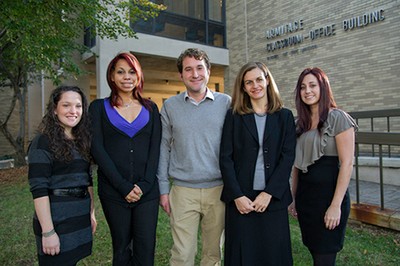Hands-on experience is foundation of future success
CAMDEN — In most introductory courses to psychology across the nation, students will spend classroom time learning basic research methods. But it’s actually doing the research in a lab setting that allows them to bring those concepts to life.At Rutgers–Camden, psychology majors are getting the opportunity to work with faculty members on research projects to understand how the field of psychology can be applied to understand and improve people’s lives.
“Our psychology department has always been focused on research,” says Bill Whitlow, a professor of psychology at Rutgers–Camden. “The emphasis has always been to engage students in doing psychological research in the many different forms it can take.”
With 500 students, the psychology department is the largest in Rutgers–Camden’s College of Arts and Sciences. Whitlow says undergraduate and graduate students performing research with faculty members makes the psychology department at Rutgers–Camden unique. He says it builds confidence in the students and puts them in a position to build a successful career.

Jennifer Kelley, a senior psychology and childhood studiers major from Cherry Hill, is working with Charlotte Markey, an associate professor of psychology at Rutgers–Camden, on research that determines romantic relationship influences on health.
“Learning how to do everything from data collection to analyzing results are skills that will be beneficial to me both as a student and eventually, as a psychologist,” Kelley says. “Working in Dr. Markey’s lab allows me the opportunity to enhance my research skills through practice and by applying what I learn in the classroom to my research.”
Markey, who works with a number of undergraduate and graduate students on various research projects, says the research experience not only contributes to students’ academic experience at Rutgers–Camden, but also helps them to appreciate the research process.
“Working with a faculty member helps the students develop a rapport with that faculty member and with other students working in the lab,” Markey says. “These relationships can be valuable as students prepare for future education and a career. Students in my lab often attend conferences together and explore graduate school options with one another. Research experience can help students get into graduate school and may open up job opportunities in a variety of fields ranging from market research to the pharmaceutical industry.”
Gianna Bowler, a senior psychology major from Washington Township who also works with Markey, says being mentored by the faculty at Rutgers–Camden is a prime benefit of doing research.
“The amount of knowledge I have gained through my experience as a research assistant has given me direction on what paths I would like to follow after graduation,” Bowler says. “I have learned many aspects of conducting research, such as research design, ethical considerations, data collection, and analysis of results.”
Sean Duffy, an associate professor of psychology at Rutgers–Camden, echoes Bowler’s comments when he says research helps Rutgers–Camden’s psychology majors forge their own path using the skills they learned at Rutgers–Camden.
“They get the chance to learn the mechanics underlying research, and the vast distance between the inception of an idea and the final study being published,” Duffy says.
Duffy is working with graduate student Salinas Griffith, who also earned her bachelor’s degree in psychology from Rutgers–Camden, on research that examines how people unconsciously imitate other individuals with whom they are interacting.
“Research gives you a lot of experience,” says Griffith, who is from Pemberton Township and now lives in Camden. “It allows me to not only work with Professor Duffy, but also the people he collaborates with, and it really puts all of the theory you learn to use.”
Whitlow says, “Having research skills and data analysis skills gives students an edge. We have a good track record in advancing students to higher levels of academic accomplishment or professional accomplishment and a lot of the credit goes to their research experience.”
For more information about the Department of Psychology at Rutgers–Camden, visit psychology.camden.rutgers.edu.
Media Contact: Ed Moorhouse
(856) 225-6759
E-mail: ejmoor@camden.rutgers.edu